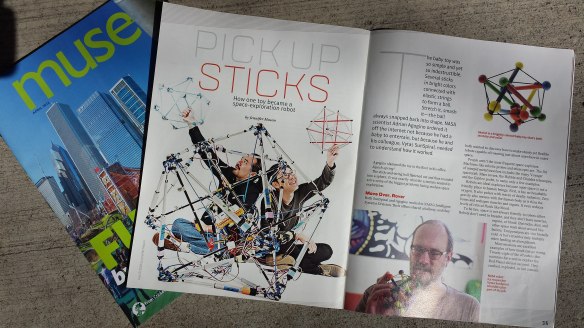Can we convince young people to enjoy failure as much as they enjoy play? Can we teach them that the two are inseparable travel-mates on the path to success?

“Pick Up Sticks: How One Toy Became a Space-Exploration Robot”—my latest article appearing in the April 2018 issue of Muse—confronts these very questions. Like all scientists, the NASA engineers and researchers I interviewed dealt with failure throughout their project development. Turning a baby toy into a cutting-edge, all-new type of intelligent, supple, muscular robot able to shake, rattle, and roll across unknown surfaces on the planets and moons on the fringe of our Solar System is no easy task. Trials and errors are practically programmed into the experience.
But lead investigator Vytas SunSpiral and lead AI programmer Adrian Agogino did not shy away from failure. Whenever a motor or sensor failed, whenever the SuperBall Bot fumbled an obstacle course, whenever a computer simulation warned that what they sought was impossible, SunSpiral and Agogino celebrated. For them, a flub was a chance to ask more questions. A chance to learn. A chance to grow.
As they see it, the entire scientific process is a chance to play—get creative with problem-solving, think upside-down thoughts, tinker, toy, enjoy, and take lightly the darkest moments.
I dunno about you, but I did not have this kind of relationship to failure when I was growing up. I avoided failure. Dreaded it. Worked tirelessly to prevent it. Contained my whole existence in a kind of scalding, suffocating steam-press just so failure’s wrinkles might never arise. No matter how supportive and praising my personal circles, I was convinced that if I failed to any degree I would be a blight. A disgrace. To myself. To my friends. To my parents. To anyone.
And I know I was not unique in this regard. Other children I grew up with shared this revulsion. Kids and young people I work with now exhibit the same anemone’d response to failure’s shark-like shadow.
How did I (or any of us) acquire this skewed view of reality? Probably the same way a mind turns intractable on monsters under the bed.
The more salient question is how can we reverse the paradigm and make failure fun? Can we make it a tantalizing outcome—an alien world begging for exploration?
Purchase Muse online or check your local library for the latest issue!
コメント